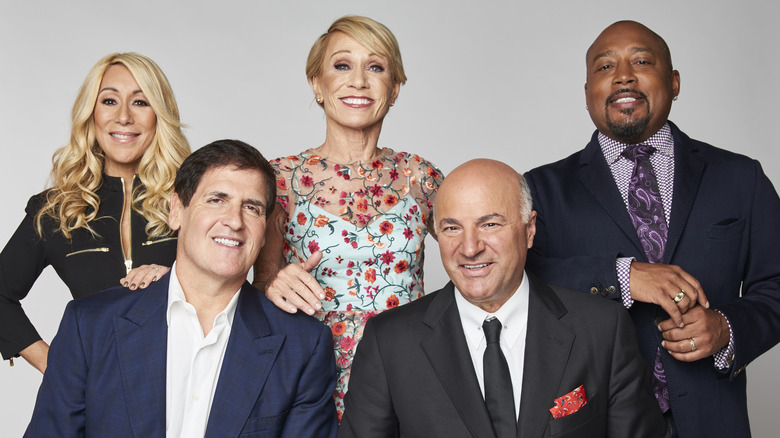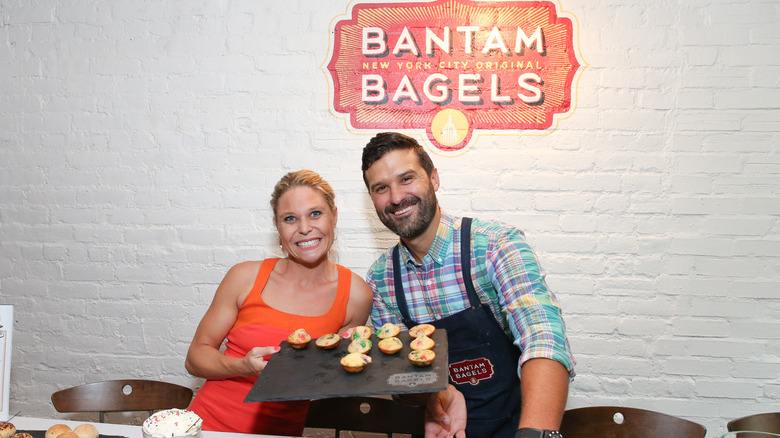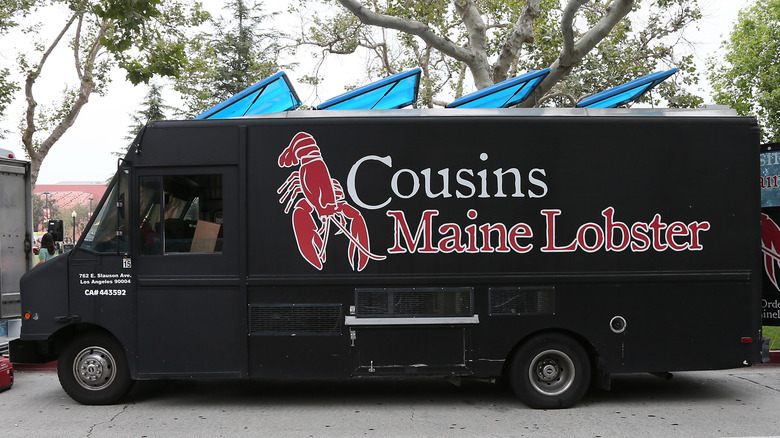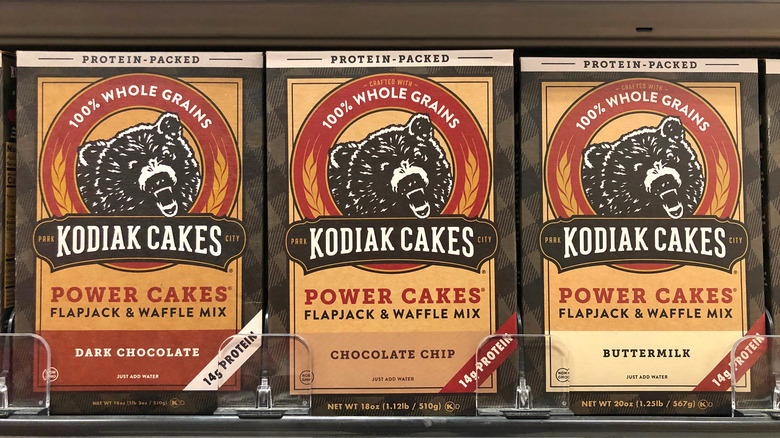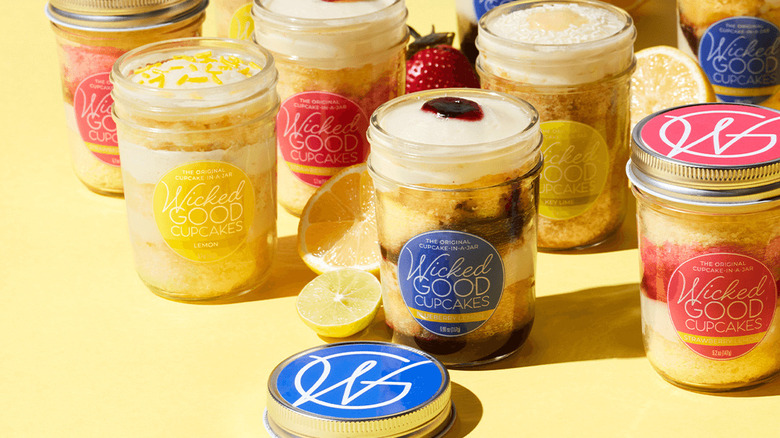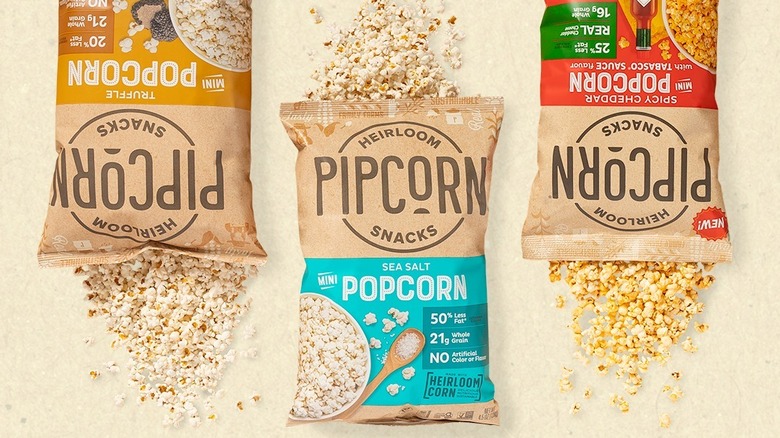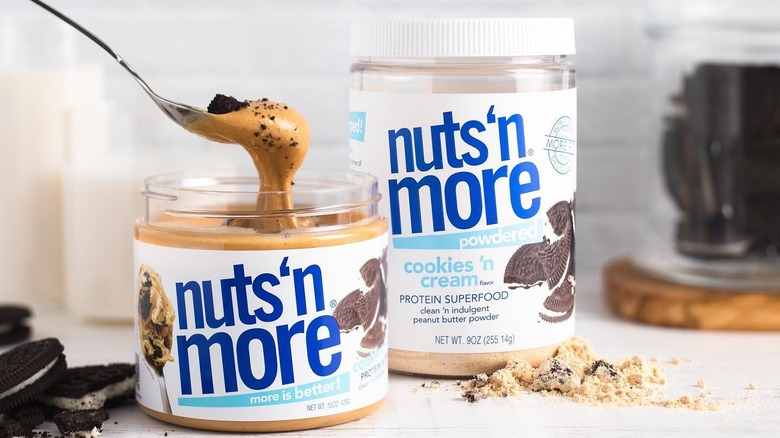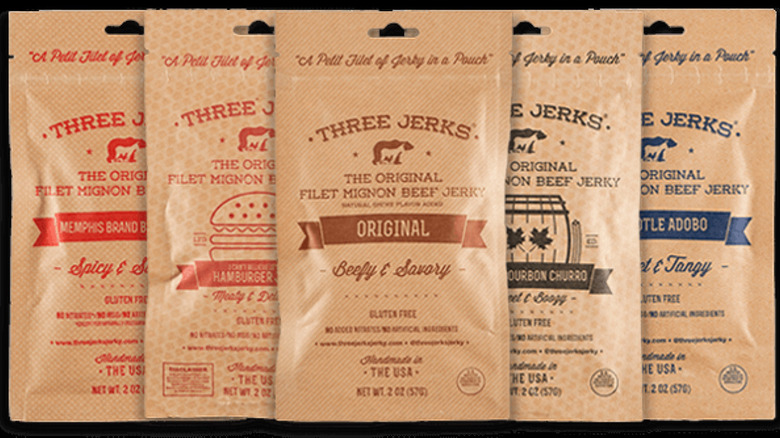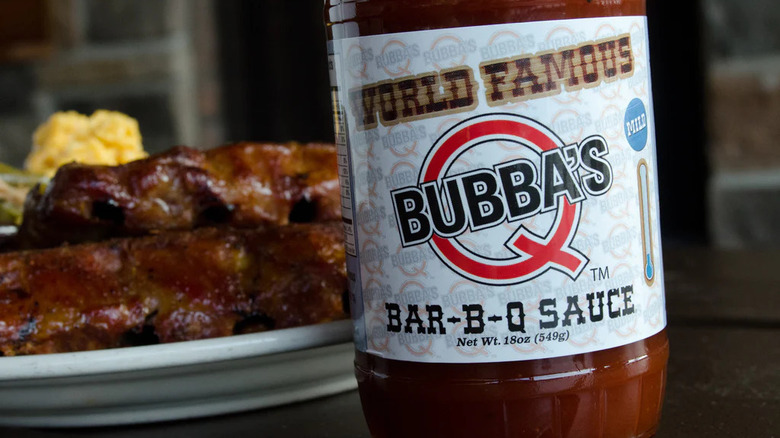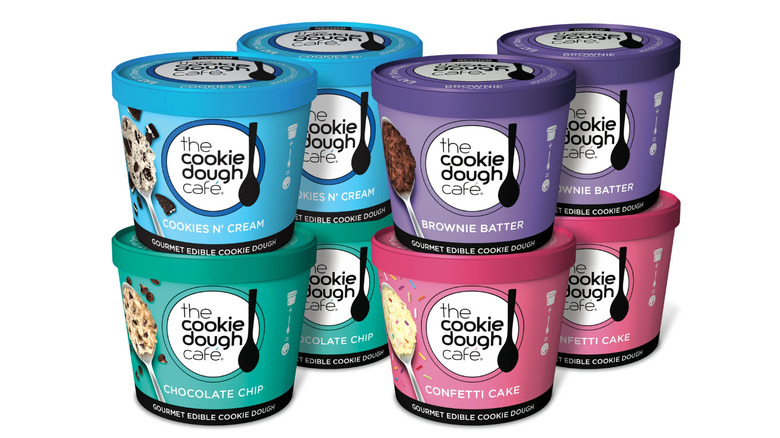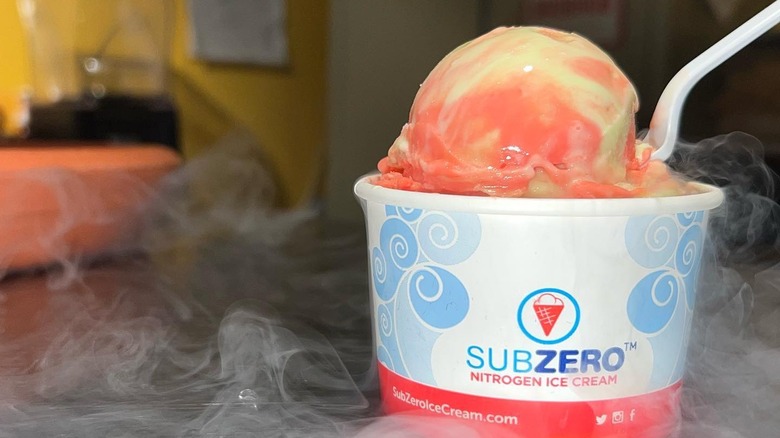The 11 Biggest Food Wins To Come Out Of Shark Tank
Aspiring entrepreneurs, business school graduates, and curious bystanders alike have been captivated over the years by "Shark Tank." The hit ABC series showcases real-life business pitches to a panel of investors with net worths in the millions and even billions (via SCMP). Hundreds of hopeful business owners have brought their products and services to the sharks over the course of over one dozen seasons in the hopes of an investment that can bring their companies to the next level. Many sink to the bottom, while others rise to the top, with a lucky few even becoming household names.
If you are not an avid follower of "Shark Tank," then you may be surprised to find out just how many food and drink companies have appeared on the show over the years. While many might associate "Shark Tank" success stories with products like Scrub Daddy, Bombas, or the Simply Fit Board, there are a number of tasty treats that have found mass market appeal thanks to their appearance on the television series. Whether or not these products actually accepted an offer from one of the sharks, the air time alone has meant big business for many of these brands.
1. Bantam Bagels
If you visited a Starbucks around 2015 and 2016, then you are probably familiar with Bantam Bagels. The cream cheese-stuffed, bite-sized bagel snack first appeared on "Shark Tank" after owners Nick and Elyse Oleksak opened their bagel shop in New York City in 2013. With some publicity prior to their appearance, including a coveted spot on Oprah's 2014 Favorite Things list, the owners went onto the show feeling confident. This confidence paid off. They made a deal with Lori Grenier, accepting her offer of $275,000 for a 25% stake in the company.
Starbucks was not the only place to find Bantam Bagels in the years following the "Shark Tank" appearance. In addition to the several thousand coffee shop locations where Bantam Bagels would appear, shoppers could also find the bite-size bagel snacks in their local grocery stores (via CNBC). The business grew so much that it was actually sold in 2018 for a staggering $34 million, making it one of the most lucrative "Shark Tank" deals ever (via Fox Business). Bantam Bagels were eventually pulled from the shelves at Starbucks, and they are not quite as common in grocery stores as they once were, but it was still a very large payday for the original owners, thanks to a little help from the show.
2. Cousins Maine Lobster
If you are an avid food truck foodie, then you have probably heard about Cousins Maine Lobster. The first Cousins Maine Lobster Truck hit the roads in 2012, with an immediate positive response from customers. The opportunity of a lifetime was almost instantaneous, though the owners admitted they wanted a few more months of experience before the ultimate plunge into the "Shark Tank." At the time, the show's producers were actually regular customers of the food truck. They even asked the owners to be featured on an episode multiple times. Eventually, the owners agreed and appeared on the show with one specific shark in mind — Barbara Corcoran (via Cousins Maine Lobster).
Ten years following its launch, the mobile seafood eatery now operates 60 trucks across the United States, and they were even able to open a few stand-alone restaurants. The owners shared with QSR Magazine that business was impacted by the COVID pandemic in 2020. However, the outdoor format of food trucks and the ability to social distance softened the blow. Fortunately, they were able to bounce back, with sales increasing by 37% year-over-year as of 2021.
3. Kodiak Cakes
No one is going to argue that pancakes and waffles are not among the tastiest, most indulgent breakfast items you could ask for. However, many will admit that they are something you probably should not eat daily or even weekly for that matter. Kodiak Cakes entered the food scene on a mission to change the narrative around pancakes and waffles with its lineup of healthier batters, using whole grain, protein-dense ingredients. The company was actually founded decades before the first '"Shark Tank" episode ever aired, in 1982. Then, Penny Clark had her eight-year-old son sell bags of her father's family pancake mixture (via Kodiak Cakes).
What happened next might come as a surprise, especially when you consider Kodiak Cakes is one of the most successful products to come out of "Shark Tank" (via Yahoo Money). Despite offers coming in from multiple sharks, the owners actually walked away without a deal. The television air time was all that the company needed, however, as sales skyrocketed following the episode's premiere. You can probably find an entire lineup of Kodiak Cakes products at your local grocery store these days, making this one product the sharks probably wished they negotiated harder for.
4. Wicked Good Cupcakes
There is nothing sweeter than reinventing tried-and-true classic desserts, flipping the script of what a snack can look and feel like. Rather than get messy with cupcakes crumbling in your hands as you peel off the wrapper, Wicked Good Cupcakes took all of the best things about the treat and put them in a mason jar. Founded in 2011, they saw rapid success after their 2012 "Shark Tank" presentation, with a 600% increase in sales in the first year following their episode airing (via Boston Voyager).
Then, the company exploded onto the national scene driven by the investment from the show's Kevin O'Leary (via Wicked Good Cupcakes). Along with the $75,000 investment, O'Leary has even signed some of the mason jars for fans over the years. The brand also was able to sell its one-millionth cupcake in 2016, just a few years after the "Shark Tank" episode aired (via ABC). These days, fans can find Wicked Good Cupcakes products as a Hickory Farms food gift option. You can also still order Wicked Good Cupcakes products on the company website.
5. Pipcorn
If you have not gotten in on the flavored popcorn craze, then you may be missing out. Popcorn can be enjoyed in so many more varieties than your standard butter flavor, though, admittedly, you cannot beat the classics. And, many companies have attempted to capitalize on the growing snack trend. One of the more successful tries came from Pipcorn, a company straight out of "Shark Tank."
Sibling team Jennifer and Jeff Martin accepted an offer from Barbara Corcoran for $200,000 in exchange for a 10% stake in the company, and the rest, as they say, is history. Pipcorn became one of the most successful food launches from "Shark Tank," providing shoppers with a fresh new take on the popular snack food. Women's Health points out that while Pipcorn is not all that better nutritionally than your garden-variety popcorn, it is still a satisfying way to satisfy those salty cravings without too much guilt. Nutrition aside, the convenient snack made it big after "Shark Tank," earning $1.1 million in the three months following their partnership with Corcoran. Since then, the Pipcorn lineup has exploded to offer all different kinds of flavors and other products too, including cheese balls and crunchies that are similar to Cheetos. The company even rebranded and is now called Pipsnacks to better communicate its broader range of products.
6. Nuts n' More
One of the food niches that is expected to soar in the coming years is nut butter. In fact, Future Market Insights estimated the nut butter market size was $1.1 billion in 2022 but that it would become a $2.5 billion industry by 2032. These numbers prove that nut butter is big business. Nuts n' More hopped on that train early on in season four of "Shark Tank" and has enjoyed the ride ever since.
The nut butter biz received a tandem offer from sharks Mark Cuban and Robert Herjavec, helping the company reach its first $1 million in sales several months after its episode aired (via Gazette Review). The company has since exceeded its initial estimated value back when it first appeared on the show. This is in part boosted by the fact that its lineup of nut butter comes packed with various nutrients. Customers love that they can enjoy these tasty snacks while embarking on their health and fitness journeys. According to the company's website, Nuts n' More spreads contain whey protein isolate, which has all of the amino acids your body needs. Adding powders and snack packs to its lineup of products over the years also helped boost sales, making Nuts n' More a true "Shark Tank" success story.
7. Three Jerks Jerky
The tongue-in-cheek name Three Jerks Jerky could only be made better by the fact that when it came time to pitch the product to the sharks on "Shark Tank," there were only two owners present. Having cut ties with the third founder before appearing on the show, owners Daniel Fogelson and Jordan Barrocas landed a deal with Daymond John — thus becoming the sought-out third jerk. He offered them $100,000 for a 15% stake in the company, with an additional $100,000 for an additional 15% if the owners desired in the future. John beat out three other sharks' offers with the deal.
The agreement proved lucrative for the owners as well as John. According to Yahoo News, John has shared that Three Jerks Jerky was one of his biggest deals at the time. Success was immediate, with Three Jerks Jerky earning a staggering $1.4 million in revenue in only three weeks following the episode airing. It just goes to show that even a product as simple as jerky can find huge earnings just from an appearance on "Shark Tank."
8. Bubba's Q Boneless Ribs
Daymond John appears to have a knack for picking food products on "Shark Tank" that are destined for success. John partnered with another meat-loving business, Bubba's Q Boneless Ribs. Founded by former NFL player Al "Bubba" Baker, Bubba's Q was launched as a catering business between him and his wife, Sabrina (via Bubba's Q). The tasty barbecue impressed the sharks, but what proved to be even more impressive were Bubba's two patents that he held for the process of making the signature boneless ribs (via Google Patents).
Bubba accepted an offer from Daymond John for $300,000 in exchange for a 30% stake in the company. Since the "Shark Tank" episode aired, sales have skyrocketed, and Bubba even secured a deal with the fast food chains Carl's Jr. and Hardee's. John once revealed that he considered Bubba's Q Boneless Ribs to be one of the most successful deals he has made on "Shark Tank," according to Yahoo News. While food can be a risky business to bring on "Shark Tank," in the case of Al "Bubba" Baker, it proved to be a touchdown.
9. The Cookie Dough Cafe
Raw cookie dough is perhaps one of the most guilt-ridden pleasure snacks we will ever admit to eating, despite the risk of Salmonella, E.coli, or other food-borne bacteria. There is no denying that it is delicious, however, which over the years has led to a rise in edible cookie dough products. The Cookie Dough Cafe capitalized on this trend, with sisters and co-owners Joan Pacetti and Julia Schmid pitching their product (which at the time they claimed was the only safe-to-eat cookie dough product on the market) to the sharks in season five of "Shark Tank."
The pair initially struck a deal with Lori Grenier and guest shark Steve Tisch for $100,000 in exchange for a 30% stake in the company. However, like many of the handshakes viewers see on "Shark Tank," the deal ultimately did not work out. Nearly a decade has passed since the episode first aired, and The Cookie Dough Cafe is still thriving. Despite the fact that major competitors have jumped in on the edible cookie dough trend, Cookie Dough Cafe is found in nearly 10,000 retail locations, as well as their own location in Portland, Oregon.
10. Sub Zero Ice Cream
When you walk into an ice cream shop, you are typically greeted by rows of pre-made ice cream just waiting to be scooped. Sub Zero Ice Cream wanted to flip that business model on its head with its process of flash-freezing custom-ordered ice cream. Thanks to a little help from some liquid nitrogen, the method proved to be a big selling point when it appeared on "Shark Tank." Unfortunately, the unique spin on making the ice cream was not enough to garner any winning offers from the sharks — though they did express support to the owners on their way out.
While that setback could cause some businesses to flatline, the unique ice cream company continued to persevere. Plus, the airtime on "Shark Tank" still provided a big bump in business. The company has more than doubled its number of franchise locations. As of 2020, there were 50 locations planned or in operation across 17 states in the U.S. (via Franchising.com). It was also awarded a patent for its liquid nitrogen freezing process, which applies retroactively as well.
11. Atlas Monroe Plant-Based Fried Chicken
The huge success of plant-based meat products like Beyond Meat has inspired many other entrepreneurs to enter the meatless foods industry, and some have even wound up on "Shark Tank." One of those companies was Atlas Monroe Plant-Based Fried Chicken, with the owner Deborah Torres turning down an eye-popping offer from Mark Cuban and guest shark Rohan Oza for $1 million in exchange for 100% of the company. Offers rarely go that high but the deal had Torres only receiving 10% of the royalties.
Turning down the offer proved to be a great decision, as the plant-based fried chicken company earned $2 million in profits in the two years between the episode airing in 2019 and 2021 (via VegNews). Compared to other food products that have seen great success after "Shark Tank," Atlas Monroe Plant-Based Fried Chicken is still in its infancy. However, Torres is determined to be the leading manufacturer of plant-based fried chicken in the world. With a San Diego warehouse acquired in 2021, the company may well be on its way to achieving that status.
